St. Mike’s Celebrates 170 Years

1852 – 2022
Featured image: St. Michael’s College, Clover Hill buildings between 1862-1872, USMC Archives. Inset: Odette Hall, Spring 2022.
From a list handwritten in 1852 of St. Michael’s very first students through to the speedy pivot to online classes after the Covid pandemic prompted lockdowns in Toronto in 2020, the following timeline documents 170 years of St. Michael’s serving our community. As St. Mike’s 180: Rooted in the Future notes, we are dedicated to building a welcoming, inclusive community that thrives on excellent academics and understands the need to serve the common good. Happy 170th!
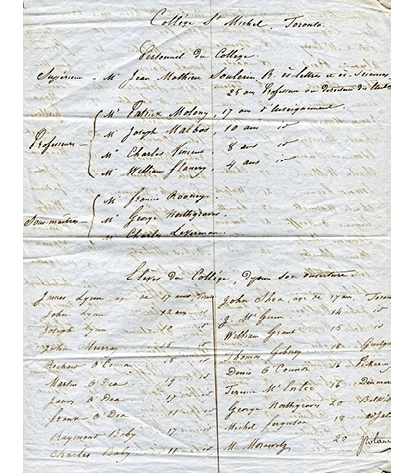
1850
Newly-appointed Bishop of Toronto, Armand-François-Marie de Charbonnel, a former Basilian student in Annonay, sees a need for Catholic education among the poor Irish Catholic families in his diocese and invites his former teachers to come to Canada. The Basilians send four priests, a significant percentage of their total number of available priests, to establish a school in Toronto.
1852
The Basilians open St. Michael’s College offering, in the French style, a combination of high school and post-secondary education in Toronto.
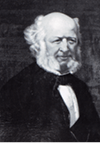
1853
Catholic philanthropist Captain John Elmsley donates land from his Clover Hill estate to the Basilians for the construction of St. Michael’s College and a collegiate church. This land was adjacent to the University of Toronto, founded in 1827, and it was part of the Toronto Purchase, claimed by the Crown in 1805 and finally settled with the Mississaugas of the Credit First Nation in 2010.
1855
An Act of Incorporation of St. Michael’s College receives Royal Assent.
Laying of the cornerstone of the St. Michael’s College and St. Basil’s Church building on Clover Hill, William Hay, architect.
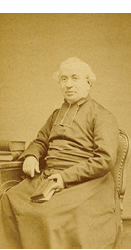
1856
St. Michael’s College and St. Basil’s Church open at their new Clover Hill location. Jean-Mathieu Soulerin, CSB, is named Superior of the College and pastor of the Church. St. Basil’s is consecrated.
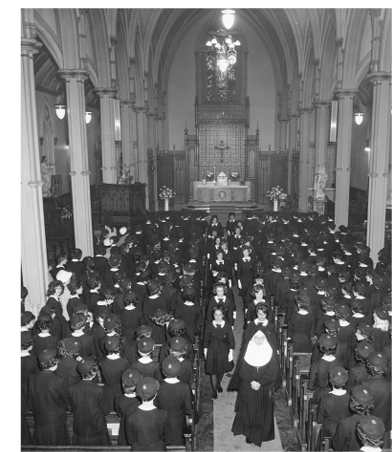
1863
The Sisters of St. Joseph come to St. Basil’s Parish to open a school and assist in the parish.
1878
St. Michael’s College Alumni Association is established.
1881
St. Michael’s College officially affiliates with the University of Toronto, with a guarantee to be able to conduct its own teaching in philosophy and history.
1889
The Senate of the University of Toronto authorizes separate examinations in philosophy for St. Michael’s College.
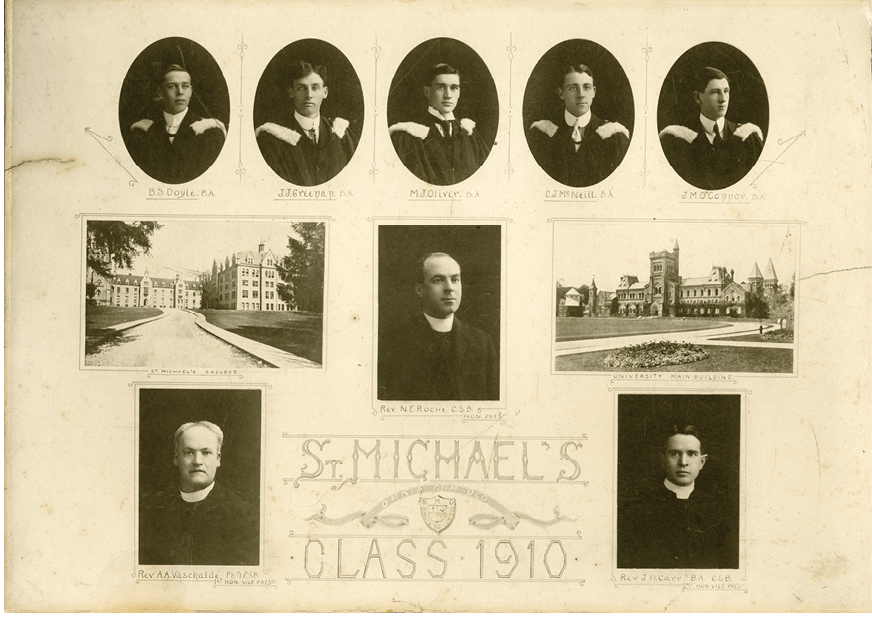
1910
St. Michael’s College is declared a federated college in the Faculty of Arts and Science of the University of Toronto. Under this arrangement, St. Michael’s students can study for University of Toronto undergraduate degrees while attending classes taught by St. Michael’s faculty members. The College School adopts the Ontario high school curriculum.
1911
St. Michael’s presents six students for the B.A. degree from the University of Toronto.
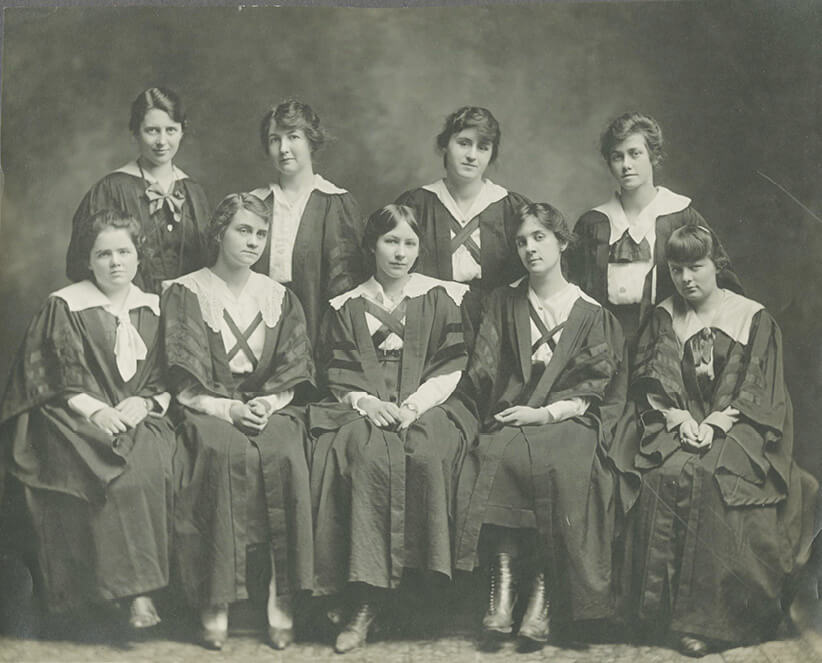
The class photo was taken in 1918 in their second year.
1911
Sir Robert Falconer, President of the University of Toronto, recognizes the wish of St. Joseph’s College and Loretto College to affiliate with the University and their female students can receive University of Toronto degrees. This leads to their affiliation with St. Michael’s College in 1912.
1918
Founding of the ‘Student Administrative Council’ (SAC), renamed in the 1960’s as the ‘St. Michael’s College Student Union’ (SMCSU).
September, 1920
St. Joseph’s University Hall opened at 25 Queen’s Park Crescent.
1920
St. Michael’s College acquires two acres from the Elmsley estate to complete the college property west to Victoria College.
1922
St. Michael’s begins teaching graduate courses in philosophy.
1922
Demolition of the buildings on the east side of the College property to make way for the construction of Bay Street.
October, 1926
Acquisition of the Christie House at 29 Queen’s Park Crescent by the Sisters of St. Joseph as the site for St. Joseph’s College.
January, 1928
St. Michael’s College purchases properties on Elmsley Place from the Elmsley estate to extend its campus westwards towards Queen’s Park and the University of Toronto.
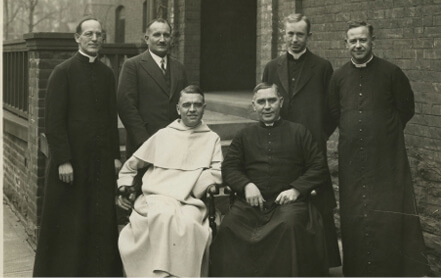
1929
St. Michael’s expands further into graduate teaching and research by opening the Institute of Mediaeval Studies, founded by Fr. Henry Carr, CSB, Étienne Gilson, Fr. Edmond McCorkell, CSB, and Fr. Gerald Bernard Phelan, CSB. In 1939, Pope Pius XI’s papal charter decrees the Institute as Pontifical, accelerating
St. Michael’s prominence in the Catholic philosophical world.
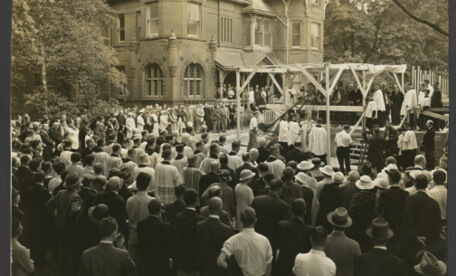
1935
The cornerstone of the Queen’s Park Building is laid. It will house the Pontifical Institute of Mediaeval Studies, residences More, Fisher, and Teefy Houses, and classrooms and faculty offices in Teefy Hall.
September 1939
Opening of Brennan Hall, containing a dining hall, faculty dining room, common rooms, and guestrooms.
October 1939
Pope Pius XI signs a papal charter creating the Pontifical Institute of Mediaeval Studies (PIMS), and empowering it to grant degrees. PIMS holds its first Convocation for the conferring of degrees on June 5, 1940.
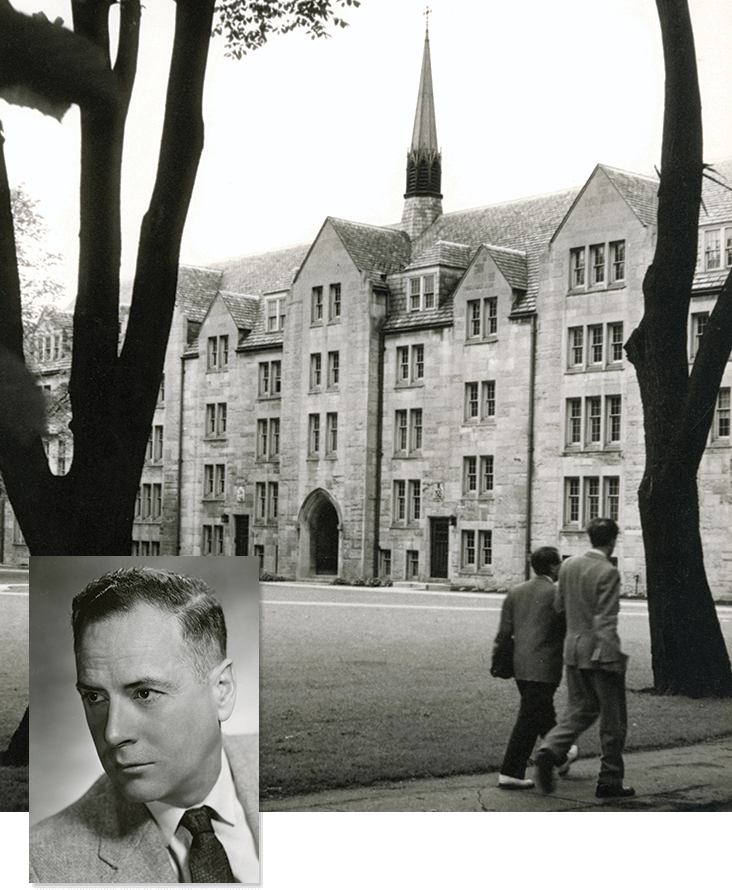
1946
Marshall McLuhan is one of the first laypersons hired to teach at St. Michael’s, where he teaches English until his death in 1980. The Canadian philosopher becomes famous for his research in media theory, which he publishes in The Mechanical Bride (1951), Understanding Media (1964), and The Medium is The Massage (1967). He is credited with coining the expressions “the medium is the message” and “global village”.
1947
First issue of The Mike, the student newspaper of St. Michael’s College.
September 1950
The high school leaves Clover Hill and the St. Michael’s campus and becomes autonomous with the opening of St. Michael’s College School at 1515 Bathurst Street.
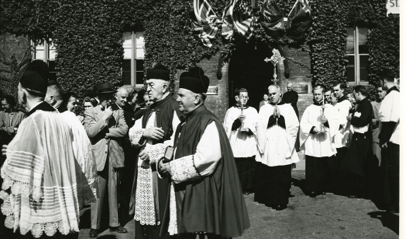
Centennial procession entering St. Basil’s Church.
Msgr. J.V. McAuley,
Fr. Robert Scollard, CSB,
Fr. Simon Perdue, CSB,
Fr. John Lee, CSB,
Fr. Hugh Curran, CSB. September 1952.
1952
Celebrations for the centennial of the founding of St. Michael’s College include an anniversary banquet.
Rt. Hon. Louis St. Laurent, Prime Minister of Canada, is the guest of honour.
September 1952
Last lectures for women at Loretto and St. Joseph’s Colleges; henceforth all teaching for men and women is conducted coeducationally in the classrooms of St. Michael’s College.
1954
The Ontario Legislature passes an amendment that allows St. Michael’s College to grant degrees in theology.
His Eminence James C. Cardinal McGuigan becomes St. Michael’s first Chancellor.
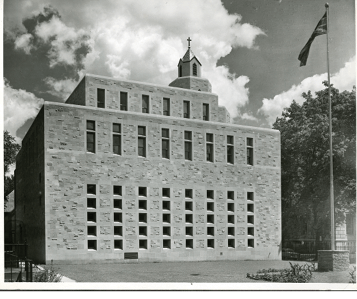
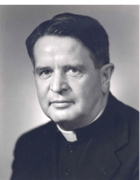
1954
Carr Hall opens at 100 St. Joseph Street and is home to faculty and administrative offices, classrooms, library, auditorium, and Co-Op cafeteria. It is named in honour of Fr. Henry Carr, CSB, who served as Superior and President of St. Michael’s College from 1915-1925.
September 1955
The cornerstone of Elmsley Hall, a men’s residence at 81 St. Mary Street, was laid by Cardinal McGuigan.
July 1, 1958
The University of St. Michael’s College Act goes into effect granting St. Michael’s university status as a federated university within the University of Toronto. Fr. Laurence K. Shook, CSB, assumes office as the first President and Vice-Chancellor of the University of St. Michael’s College. This marks the separation of the office of the religious head of the Basilian Fathers of the College, the Superior, from that of the executive and academic head of the University, the President.
September 1958
Fr. John M. Kelly, CSB, assumes office as the second President of the University.
June 1961
Full-time enrolment at St. Michael’s surpasses 1,000 for the first time.
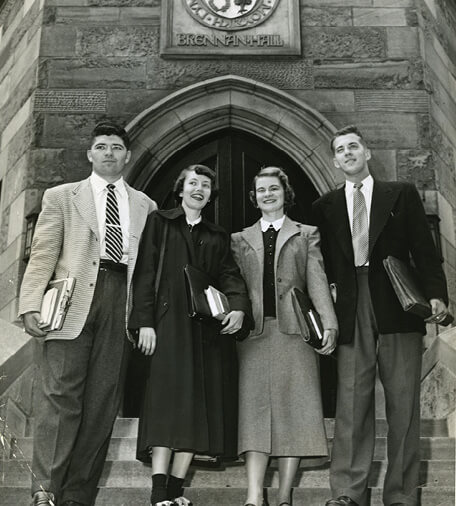
1968
Opening of the Brennan Hall Student-Faculty Centre, an extension of the building containing a student lounge, assembly hall, students’ council offices, The Coop cafeteria, offices and meeting rooms.
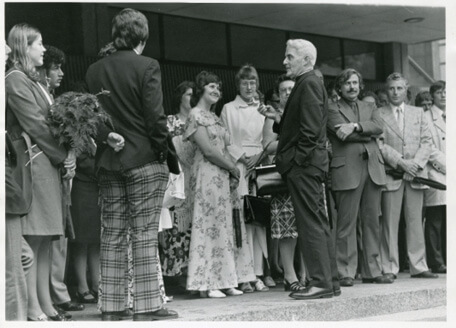
1969
Opening of the library at 113 St. Joseph Street. It is later named the John M. Kelly Library, paying tribute to Fr. John Kelly, CSB, who served as President and Vice-Chancellor of the College for 20 years.
April 1970
Incorporation of the Toronto School of Theology, an ecumenical consortium of the Catholic and Protestant theological colleges of the University of Toronto, including the Faculty of Theology of the University of St. Michael’s College.
May, 1974
The University of St. Michael’s College signs, along with the other federated universities, a Memorandum of Understanding with the University of Toronto. Federated Colleges are permitted to offer distinctive interdisciplinary programs for the benefit of the entire undergraduate body. St. Michael’s draws from its rich academic traditions and creates programs in Celtic Studies, Mediaeval Studies, and Christianity & Culture. In 2003, the College creates the Book & Media Studies Program.
January, 1976
The offices of President and Principal are separated. Dr. Lawrence Lynch assumes office as the first Principal of St. Michael’s College, the undergraduate division of the University of
St. Michael’s College. He is succeeded by Dr. William Dunphy in 1981, Dr. Joseph Boyle in 1991, Dr. Mark McGowan in 2002,
Dr. Domenico Pietropaolo in 2011, Dr. Randy Boyagoda in 2016, and Dr. Mark McGowan, who returned to St. Michael’s as Interim Principal and Vice-President, in 2020.
July, 1978
Fr. Peter Swan, CSB, assumes office as the third President and Vice-Chancellor.
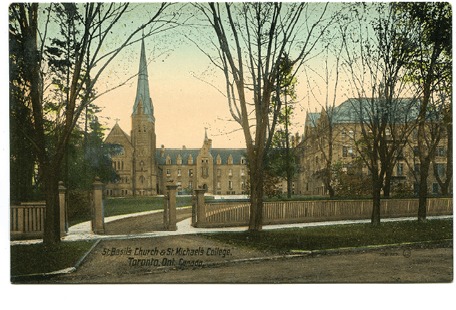
1979
St. Basil’s Church is deemed to be of cultural heritage value as an example of early English Gothic style.
The church was designed by the prominent architect, William Hay.
October, 1983
Opening of Alumni Hall at 121 St. Joseph Street, the former Ontario Research Foundation building, renovated for College use containing classrooms, academic offices, a theatre and the Registrar’s Office.
July, 1984
Fr. James McConica, CSB, assumes office as the fourth President and Vice-Chancellor.
April, 1986
The Division of Continuing Education is established as the fourth division of the University of St. Michael’s College (in addition to the undergraduate college, the graduate Faculty of Theology, and the Pontifical Institute of Mediaeval Studies).
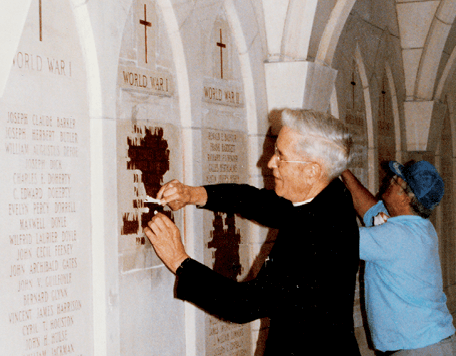
1988
Fr. William Hilary (Bill) O’Brien, CSB, inscribing the names of the fallen at the St. Michael’s College War Memorial in the slype between More and Fisher Houses. The memorial honours the 159 St. Michael’s students who were killed in the First and Second World Wars and the Korean Conflict.
July, 1990
Dr. Richard Alway assumes office as the fifth President and Vice-Chancellor, the first layperson to hold the position.
May, 1996
Dedication of Sam Sorbara Auditorium in upper Brennan Hall.
September, 1996
For the first time, academic departments (French and German) of the University of Toronto take up residence on the St. Michael’s Campus. They are followed, in September 2000, by the Departments of Italian and Slavic Studies.
September, 1996
Opening of the restored Odette Hall-Clover Hill, the oldest building on the University of Toronto campus (1856) in continuous academic use through the generous donation of Louis L. Odette. An extensive collection of modern religious art, donated by Fr. Daniel Donovan, is installed on the two lower floors.
May, 2000
#1 Elmsley Place becomes the new home for the offices of the President, Alumni Affairs and Development, and Continuing Education after restoration.
2000
Renovations to Carr Hall are completed with the dedication of the former auditorium as Fr. Robert Madden Hall.
November, 2000
Publication of the Mission Statement of The University of St. Michael’s College.
March, 2001
The Canadian Catholic Bioethics Institute (CCBI) is officially affiliated with the St. Michael’s College and takes up residence on campus.
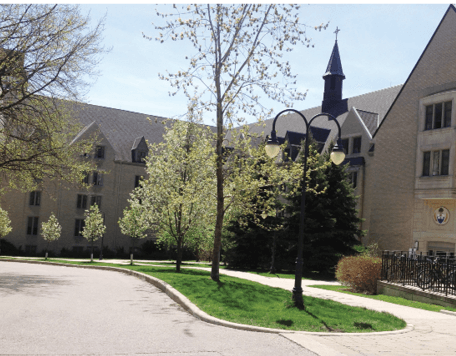
September, 2001
Opening of the Sorbara Hall Student Residence, 70 St. Joseph Street, built through the generosity of the Sorbara Family.
2002
Yearlong celebrations take place to mark the sesquicentennial of the founding of
St. Michael’s College, including a 150th Anniversary Gala Dinner at the Metro Convention Centre in September, an Anniversary Mass held in St. Basil’s Church in October, and the construction of a Prayer Garden on the north side of the ‘quadrangle’ through the generosity of St. Michael’s staff members.
September, 2003
St. Michael’s full-time enrolment reaches a record 4,200 students with the arrival of the ‘double cohort’ resulting from the elimination of Grade Thirteen in the Ontario High School system.
September, 2005
In anticipation of the closure of the St. Joseph’s College women’s residence in May 2006, St. Michael’s begins offering residence to women students in designated floors of Elmsley Hall and Sorbara Hall.
January, 2009
Sr. Anne Anderson, CSJ, assumes office as the sixth President and Vice-Chancellor.
2015
David Mulroney assumes office as the seventh (Interim) President and Vice-Chancellor.
2017
St. Michael’s introduces its first “SMC One” undergraduate program, “The Gilson Seminar in Faith and Ideas”, followed by “The Boyle Seminar in Scripts and Stories”, and “The McLuhan Seminar in Creativity and Technology” in 2018.
2018
Dr. David Sylvester assumes office as the eighth President and Vice-Chancellor.

COOP in Brennan Hall.
2019
A revitalized Brennan Hall reopens at the heart of campus. With the support of many generous donors, this rejuvenated hall is a space for the community to gather. This building now holds the offices of the Registrar, Dean of Students, Campus Ministry, and Student Council, the Canada Room and Faculty dining halls, and numerous places for study and gathering.
November, 2001
Senate approves the Certificate in Corporate Social Responsibility as an academic program within the Department of Continuing Education, in partnership with the Conference Board of Canada.
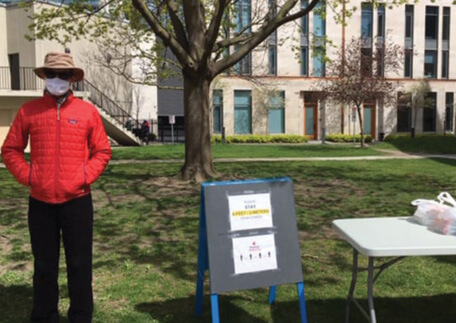
March, 2020
With in-events cancelled due to the COVID pandemic, St. Michael’s quickly pivots to online delivery of classes. Social distancing, masking, and vaccine regulations are introduced to ensure all on campus are safe.
January, 2021
St. Mike’s 180: Rooted in the Future, the University’s strategic plan leading up to its 180th anniversary in 2032, is released. The plan’s three pillars are academics, community, and sustainability.
October, 2021
St. Michael’s launches the Global Classroom, a retrofitted space designed to give students a virtual, hands-on experience. Students in the Boyle Seminar were the first to use the high-tech classroom, which allows students to examine artifacts from around the world.

May, 2022
The federation creating the Regis-St. Michael’s Faculty of Theology takes effect, with Dean Jaraslav Skira appointed as of July 1, 2022.
Content and photos courtesy of the Archives of the Institute of the Blessed Virgin Mary, Canadian Province,
the General Archives of the Basilian Fathers, the Roman Catholic Archdiocese of Toronto,
the Sisters of St. Joseph of Toronto Archives, and the University of St. Michael’s College Archives.
